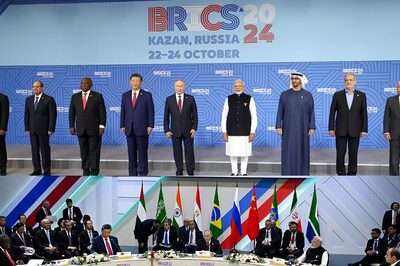
views
Vienna: Western states will try this week to overcome divisions with Russia over a UN nuclear report on Iran, hoping to show big power unity that will pile pressure on Tehran to address growing fears that it wants atomic bombs.
But Western diplomats fear they may have to choose between a tough stance that alienates Russia and China and a gentler, more inclusive approach which they say does not reflect the seriousness of a UN atomic watchdog report issued last week.
Russian criticism of the International Atomic Energy Agency (IAEA) report, which said Iran appeared to have worked on designing a nuclear weapon, has highlighted Moscow's opposition to any new UN sanctions on the Islamic Republic, a major oil producer.
Western officials in Vienna and other capital cities are scrambling to win Russian and Chinese backing for a resolution on Iran at a Nov. 17-18 meeting of the 35-nation governing board of the IAEA.
"We are at a crossroads here," a Western diplomat said, referring to the unity of the six power bloc -- the United States, Russia, France, Germany, China and Britain.
The resolution would aim to demonstrate concern about Iran's nuclear work and call on Tehran to explain issues raised by the IAEA document, which laid bare a trove of intelligence suggesting it is seeking the capability to make atomic arms.
Any board resolution would likely stop short of taking concrete action -- such as referring Iran once again to the United Nations Security Council -- in view of Russian and Chinese reluctance, diplomats said.
Iran, which denies it wants nuclear weapons, condemned the IAEA's findings as "unbalanced" and "politically motivated" but has yet to offer detailed answers to the allegations.
There has been concern that if world powers cannot close ranks on isolating Iran to nudge it into serious talks, then Israel -- which feels endangered by Tehran's nuclear programme -- will attack it.
"Our goal is to do everything we can to narrow any differences that are there," a senior Western official said.
Raising hopes this is possible, U.S. President Barack Obama said on Saturday he and Russian President Dmitry Medvedev "reaffirmed our intention to work and shape a common response so we can move Iran to follow its international obligations when it comes to its nuclear program."
No "clear thinking"
One European diplomat said about chances of finding common ground on an IAEA board resolution: "It depends on what the Americans agree with the Russians. We are waiting."
Russia is part of the group of six world powers urging Iran to be more transparent about its nuclear programme.
But it has been softer on the Middle Eastern country than the United States and the European Union, and has worked with China to water down previous U.N. Security Council sanctions.
Russia has said the IAEA report contained no new evidence and was being used to undercut efforts to reach a diplomatic solution to the long-running nuclear row, which has the potential to spark a wider conflict in the volatile region.
"The Russians are very unhappy about the annex," another European diplomat said, referring to a 13-page section of the IAEA document which cited "credible" information alleging work on atomic bomb triggers and computer-simulated detonations.
But other Western diplomats said Russia still had concerns about the nature of Iran's nuclear programme, even if it disagreed on how to best handle the dispute.
The United States and its allies have made clear their intention to tighten sanctions on Iran, even though EU foreign ministers on Monday decided to wait until their next meeting on Dec 1. before taking further action.
Russia, which has significant trade ties with Iran and built its first nuclear power station, has called for a phased process under which existing punitive measures would be eased in return for actions by Tehran to dispel international concerns.
But in talks between Iran and big powers that would be needed to achieve that goal, the sides have been unable to agree even on an agenda. The last round petered out in January.
U.S. officials say sanctions in place against Iran have done severe damage to its economy, and increased fractures among Iran's elite.
Tehran is showing no sign however of buckling to U.S.-led international demands that it halt uranium enrichment -- which can have both civilian and military uses.
"The U.S.-Iran enmity has a strong emotional and psychological dimension that has rendered clear thinking more difficult on both sides," Trita Parsi, a Washington-based expert on relations between the two foes, said.




















Comments
0 comment